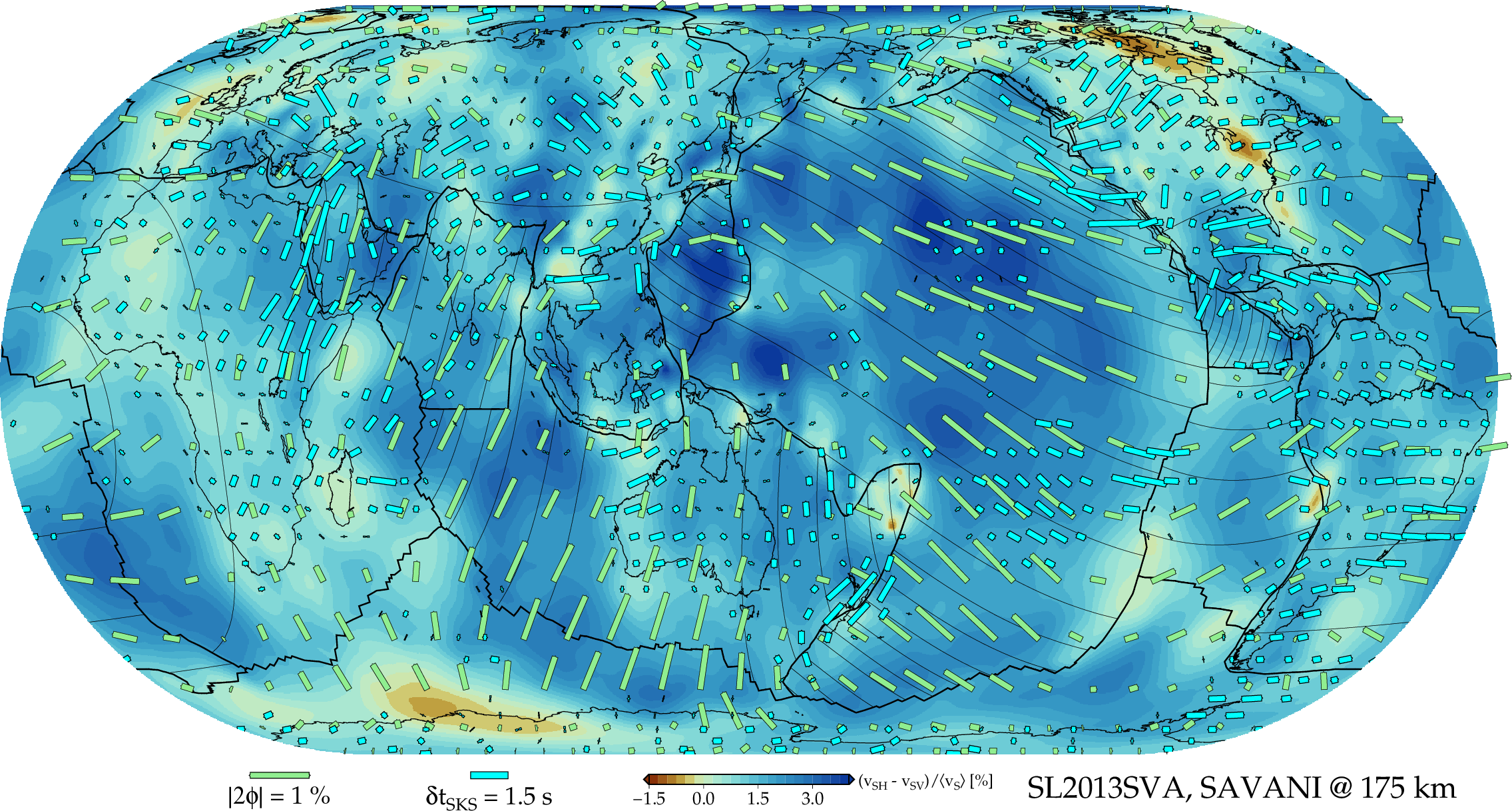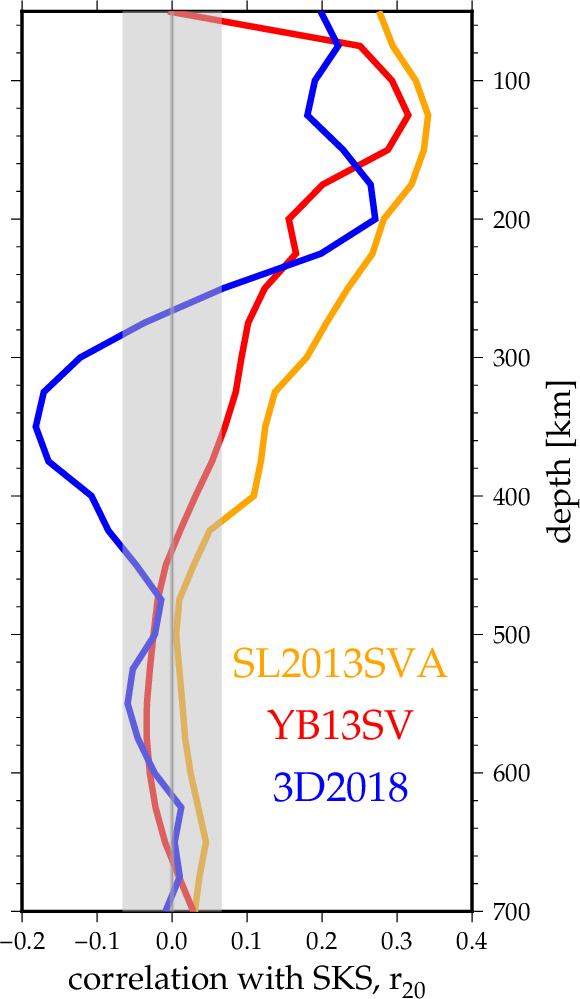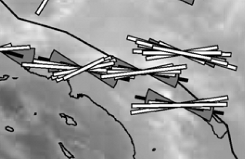[news]
[research]
[teaching]
[team]
[publications]
[CV]
[contact]
downloads:
[software]
[tomography]
[visualizations]
[global maps]
[SKS compilation]
[APM model]
[LPO model]
[lecture notes]
[papers]


Spherical harmonics expansion (cyan sticks) of our SKS database,
updated from Becker et al. (2012),
compared to SL2013 azimuthal (green sticks;
Schaeffer et al.,
2013) and SAVANI radial
(background coloring; Auer et al., 2014)
anisotropy at 175 (left), and
correlation with different azimuthal anistropy models (right).
From Wolf et al. (2025), updated
from Becker and Lebedev
(2020), see there for details.

All SKS database entries, station averaged

All but Wolf et al. (2025) and Liu et al. (2014) automated SKS
database entries, station averaged
Here, we provide an update of the SKS splitting databased of
Becker
et al., 2012, new version as of August 30, 2025.
This work was made possible by the willingness of seismologists to
share their results, and our database is largely based on, and
reusing, the compilation efforts of G. Barruol, A. Wüstefeld, M.
Fouch, D. Schutt, and P. Silver. In particular, our database is not
meant to reproduce the ongoing efforts by G. Barruol to keep
Wüstefeld's
et al.'s (2009) SKS database updated.
However, our compilation does hold back-azimuth and event data for
some of the studies, information not available for some of the other
compilations. References for the source data bases we use include:
- Wüstefeld, A. and Bokelmann, G. H. R. and Barruol, G. and
Montagner, J. P.: Identifying global seismic anisotropy patterns by
correlating shear-wave splitting and surface-wave
data, Phys. Earth Planet. Int., 176, 198-212, 2009.
Database available online at
http://www.gm.univ-montp2.fr/splitting/DB/.
(Version as of 05/2011 was used for
Becker et al., 2012; for the current
version, see below).
- Fouch, M.: Upper Mantle Anisotropy Database, was at
http://geophysics.asu.edu/anisotropy/upper/, accessed 06/2006, 2006.
- Silver, P. G.: Seismic anisotropy beneath the continents: probing
the depths of geology, Ann. Rev. Earth Planet. Sci., 24,
385-432, 1996.
In addition to merging existing compilations and adding back-azimuth
information to many of the studies, we are adding a small number of
individual studies not found (fully, at the time of merging) in the
other compilations, some of which are listed below.
We continue to update our SKS splitting database. The newest
version (as of August 30, 2025) can be found below, the format is
as
described in the README:
-
current JSG Geodynamics individual SKS split database
(August 30, 2025):
- with and
- without the
automated analyses of Liu and Wolf.
- station-averaged SKS splits based on the updated
database (August 30, 2025)
- smoothed versions of the database
- generalized spherical harmonics (GSH) fits up to degree 20
- all splits: GSH
coefficients,
2 phi fast
orientation grid,
amplitude grid.
- all but automated: GSH
coefficients,
2 phi fast
orientation grid,
amplitude grid.
- GSH format as in
- Boschi, L., and J. H. Woodhouse, Surface wave ray-tracing and azimuthal
anisotropy: a generalized spherical harmonic approach, Geophys. J. Int., 164,
569-578, 2006.
- Becker, T. W., Ekström, G., Boschi, L.,
and Woodhouse, J.: Length scales, patterns, and origin of
azimuthal seismic anisotropy in the upper mantle as mapped by
Rayleigh waves. Geophysical J. Int., 171 451-462, 2007.
(PDF)
and implemented in the
shansyn
package.
- spatial averages
- all splits including the automated analyses of Liu and Wolf, averaged on
0.5,
1, and
2
degree grids.
- all non-automated splits (excluding Liu and Wolf), averaged on
0.5,
1, and
2
degree grids.
- SKS
database format description
We also have generalized spherical harmonics expansions of those data,
please contact me if interested.
Besides the studies used for
Becker et al. (2012), we currently include additional work by several
additional studies including those listed below (which may have later
been included in the Wuestefeld/Montpellier database, and we attempt
to check for, and then remove, duplicates)
- An updated
(06/02/2022) version of Barruol and Wuestefeld et al.'s (2009)
splitting database (IRIS copy).
- Anderson, M. L., G. Zandt, E. Triep, M. Fouch, and S. Beck (2004):
Anisotropy and mantle flow in the Chile-Argentina subduction zone
from shear wave splitting analysis, Geophys. Res. Lett.,
31, L23608, doi:10.1029/2004GL020906.
- Di Leo, J. F., J. Wookey, J. O. S. Hammond, J.-M. Kendall,
S. Kaneshima, H. Inoue, T. Yamashina, and P. Harjadi (2012), Mantle
flow in regions of complex tectonics: Insights from Indonesia,
Geochem. Geophys. Geosyst., 13, Q12008,
doi:10.1029/2012GC004417.
- MacDougall, J. G., K. M. Fischer, and M. L. Anderson (2012),
Seismic anisotropy above and below the subducting Nazca lithosphere in
southern South America, J. Geophys. Res., 117, B12306,
doi:10.1029/2012JB009538.
- Leon Soto, G., E. Sandvol, J. F. Ni, L. M. Flesch, T. M. Hearn,
F. Tilmann, Y. J. Chen, and L. Brown (2012): Significant and
vertically coherent seismic anisotropy beneath Eastern
Tibet. J. Geophys. Res., doi:10.1029/2011JB008919.
- Hicks, S. P., Nippress, S. E. J., Rietbrock, A. (2012), Sub-slab
mantle anisotropy beneath south-central Chile, Earth
Planet. Sci. Lett., 357, 203-213.
- Miller, M. S., Allam, A. A., Becker, T. W. and Di Leo, J., and
Wookey, J. (2013): Constraints on the geodynamic evolution of the
westernmost Mediterranean and northwest Africa from shear wave
splitting analysis. Earth Planet. Sci. Lett., 375,
234-243. (PDF)
- Refayee, H. A., B. B. Yang, K. H. Liu, and S. S. Gao (2013):
Mantle flow and lithosphere-asthenosphere coupling beneath the
southwestern edge of the North American Craton: Constraints from
shear-wave splitting measurements, Earth Planet. Sci. Lett.,
http://dx.doi.org/10.1016/j.epsl.2013.01.031.
- Calixto, F. J., D. Robinson, E. Sandvol, S. Kay, D. Abt,
K. Fischer, B. Heit, X. Yuan, D. Comte, and P. Alvarado (2014):
Shear wave splitting and shear wave splitting tomography of the
southern Puna plateau, Geophys. J. Int., 199, 688-699.
- Porritt, R. W., Becker, T. W., and Monsalve, G. (2014): Seismic
anisotropy and slab dynamics from SKS splitting recorded in
Colombia. Geophys. Res. Lett., 41,
doi:10.1002/2014GL061958. (PDF)
- Diaz, J. and J. Gallart (2014): Seismic anisotropy from the
Variscan core of Iberia to the Western African Craton: New constrains
on upper mantle flow at regional scales, Earth
Planet. Sci. Lett., 394, 48-57.
- Bastow I. D, Julia J., do Nascimento A. F., Fuck R.A., Buckthorp,
T.L., McClellan, J., J. et al. (2015): Upper mantle anisotropy of
the Borborema Province, NE Brazil: Implications for intra-plate
deformation and sub-cratonic asthenospheric flow, Tectonophys.,
657, 81-93.
- Bodmer, M., Toomey, D. R., Hooft, E. E., and Braunmiller, J. (2015)
Seismic anisotropy beneath the Juan de Fuca plate system: Evidence
for heterogeneous mantle flow, Geology, 43, doi:G37181.1.
- Hodges, Michael, and Meghan S. Miller. Mantle flow at the
highly arcuate northeast corner of the Lesser Antilles
subduction zone: Constraints from shear-wave splitting
analyses. Lithospher, 7, 579-587, 2015.
- Idarraga-García, J., Kendall, J. .-M. and Vargas, C. A. (2016),
Shear wave anisotropy in northwestern South America and its link to
the Caribbean and Nazca subduction
geodynamics. Geochem. Geophys. Geosyst.,
doi:10.1002/2016GC006323.
- S. Subašić, S. Prevolnik, D. Herak, and M.
Herak. Observations of SKS splitting beneath the Central and
Southern External Dinarides in the Adria-Eurasia convergence
zone. Tectonophys.,
http://dx.doi.org/10.1016/j.tecto.2017.03.027, 2017.
- McPherson, A. M., Christensen, D. H., Abers, G. A., and Tape,
C. (2020). Shear wave splitting and mantle flow beneath
Alaska. J. Geophy. Res., 125,
e2019JB018329.
- Estève, C. and P. Audet, A. J. Schaeffer, D. L. Schutt,
R. C. Aster, and Joel F. Cubley (2020). Seismic evidence for craton
chiseling and displacement of
lithospheric mantle by the Tintina fault in the northern Canadian
Cordillera. Geology, doi:10.1130/G47688.1.
- Lucas, E. M., Nyblade, A. A., Accardo,
N. J., Lloyd, A. J., Wiens, D. A., Aster,
R. C., et al. (2022). Shear wave splitting
across Antarctica: Implications for upper
mantle seismic anisotropy. Journal of
Geophysical Research: Solid Earth,
127, e2021JB023325.
- Birkey, A., Ford, H.A., 2023. Anisotropic structure of the
australian continent. Frontiers in Earth Science 10,
doi:10.3389/314.
- Grund, M., Ritter, J.R., 2018. Widespread seismic anisotropy in Earth’s lowermost mantle beneath the Atlantic and Siberia.
Geology 47, 123–126.
- results from the automated USArray analysis (see above) of
- Liu, K., Elsheikh, A., Lemnifi, A., Purevsuren, U., Ray, M.,
Refayee, H., Yang, B., Yu, Y., Gao, S., 2014. A uniform database 381
of teleseismic shear wave splitting measurements for the western and
central United States. Geochemistry, Geophysics, 382 Geosystems 15,
20752085. doi:10.1002/2014GC005267.
- Wolf, J., Becker, T.W., Garnero, E., Liu, K. H. and West,
J.D. (2025): Comprehensive global dataset of uniformly
processed shear-wave splitting
measurements. Geophys. J. Int.,
doi:10.1093/gji/ggaf076. (PDF)
You might want to use
Barruol and
Wüstefeld's SKS database instead
(or the IRIS
mirror), which have more complete references to original studies,
and a very nice map and search interface. However, our SKS database
tries to maintain back-azimuth information and has some additional
studies included.
For reproducibility, we here provide the SKS splitting
database that was used for our study on global mantle azimuthal
anisotropy:
- Becker, T. W., Lebedev, S., and Long, M. D.: On the relationship
between azimuthal anisotropy from shear wave splitting and
tomographic models. J. Geophys. Res., 117, B01306,
doi:10.1029/2011JB008705, 2012.
(PDF)
Our study included Wuestefeld et al.'s (2009) database in the 05/2011
version, with partially augmented information such as back-azimuths,
along with several additional studies, including:
- Fouch, M.J., and J.D. West (2011): The mantle flow field beneath
the western United States, in prep.
- Civello S., Margheriti L. (2004): Toroidal mantle flow around the
Calabrian slab (Italy) from SKS splitting, Geophys. Res. Lett.,
31, doi:10.1029/2004GL019607.
After removal of textual exact duplicates, the individual split
compilation as of
Becker
et al. (2012) contained 14,326 entries including nulls. This
compilation does hold, however, actual duplicate data entries with
different notation (e.g. slight differences in station location
accuracy) which are removed in a next step. Moreover, not all
original papers provided event information (needed for
back-azimuthally-dependent averaging) and only some of the entries in
the databases distinguished between individual splits and
station-averages. We therefore proceeded to process the
original SKS splits by performing a simple, arithmetic
average for all (approximately) co-located entries. This yielded 5,159
averaged entries; both data bases are provided for download below:
[news]
[research]
[teaching]
[team]
[publications]
[CV]
[contact]
downloads:
[software]
[tomography]
[visualizations]
[global maps]
[SKS compilation]
[APM model]
[LPO model]
[lecture notes]
[papers]
Updated: December 21, 2025.
(c) Thorsten Becker, 1997-2025.
|




